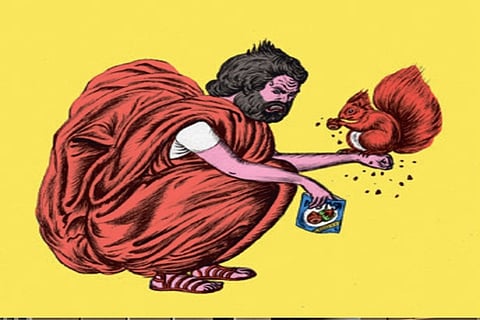

Chennai
If one were to read through the prefaces and first paragraphs of the canonical works of Western philosophy, one might assume the discipline’s primary question to be this: What makes us humans so much better than all the other animals? Really, it’s astonishing how relentless this theme is in the whole history of philosophy.
The separation of people from, and the superiority of people to, members of other species is a good candidate for the originating idea of Western thought. And a good candidate for the worst. The Great Philosopher will, before addressing himself to the deep ethical and metaphysical questions, pause for the conventional, ground-clearing declaration: “I am definitely not a squirrel.” This is evidently something that needs continual emphasising. Rationality and self-control, as philosophers underline again and again, give humans a value that squirrels lack (let’s just stick with this species for the time being), a moral status unique to us. We are conscious, and squirrels, allegedly, are not; we are rational, and squirrels are not; we are free, and squirrels are not. We can congratulate ourselves on the threat averted. But if we truly believed we were so much better than squirrels, why have we spent thousands of years driving home the point?
It’s almost as though the existence of animals, and their various similarities to humans, constituted insults. Like a squirrel, I have eyes and ears, scurry about on the ground and occasionally climb a tree. (One of us does this better than the other does.) Our shared qualities — the fact that we are both hairy or that we have eyes or we poop, for example — are disconcerting if I am an immortal being created in the image of God and the squirrel just a physical organism, a bundle of instincts. One difficult thing to face about our animality is that it entails our deaths; being an animal is associated throughout philosophy with dying purposelessly, and so with living meaninglessly. It is rationality that gives us dignity, that makes a claim to moral respect that no mere animal can deserve. “The moral law reveals to me a life independent of animality,” writes Immanuel Kant in “Critique of Practical Reason.” In this assertion, at least, the Western intellectual tradition has been remarkably consistent. The connection of such ideas to the way we treat animals — for example, in our food chain — is too obvious to need repeating. And the devaluation of animals and disconnection of us from them reflect a deeper devaluation of the material universe in general. In this scheme of things, we owe nature nothing; it is to yield us everything. This is the ideology of species annihilation and environmental destruction, and also of technological development.
Further trouble is caused when the distinctions between humans and animals are then used to draw distinctions among human beings. Some humans, according to this line of thinking, are self-conscious, rational and free, and some are driven by beastly desires. Some of us transcend our environment: Reason alone moves us to action. But some of us are pushed around by physical circumstances, by our bodies. Some of us, in short, are animals — and some of us are better than that. This, it turns out, is a useful justification for colonialism, slavery and racism. There is no doubt that human beings are distinct from other animals, though not necessarily more distinct than other animals are from one another. But maybe we’ve been too focused on the differences for too long. Maybe we should emphasise what all us animals have in common.
Sartwell is a professor of philosophy
The New York Times
Visit news.dtnext.in to explore our interactive epaper!
Download the DT Next app for more exciting features!
Click here for iOS
Click here for Android